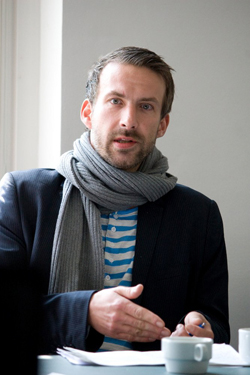
The BA2 Core Course for the spring term, on the topic of ‘Property’, co-taught by faculty members Catherine Toal and Michael Weinman, commenced on the 16th of April with two guest seminars from Frank Ruda, Visiting Lecturer at the Institute of Philosophy, Scientific Research Centre in Ljubljana, Research Associate in Philosophy at the Free University of Berlin, and the author of the book Hegel’s Rabble.
Catherine Toal referred to the book as one of the examples of the lecturer’s successful integration of an analysis of problems of contemporary concern with a reading of classic philosophical texts. Through an interpretation of Hegel’s Philosophy of Right, Ruda explores the consequences of a structural impossibility besetting civil society and the state: not everyone who needs to will be able to secure the means of subsistence through labour, and so a ‘dispossessed’ group is created (which Hegel calls the “rabble”) whose duty to society’s continued orderly functioning is thus also thrown into question.
To begin the term’s discussion on property, Frank Ruda proposed a consideration of what is ‘proper’ to the process of thinking itself, and to the definition of what it means to be human.
In the first seminar, he outlined a reading of Hegel’s 1808 essay ‘Who Thinks Abstractly?’, a text which takes its point of origin from the existence, within the “beautiful” (or aristocratic) world, of an apparently dismissive attitude to those who ‘think abstractly’, implicitly, the scholarly practitioners of philosophy. Ruda affirmed that one of Hegel’s strategies is to dismantle the assumptions which lie at the heart of this attitude, by delineating evidence which contradicts its premise and exposes symptoms of inconsistency.
The examples Hegel gives involve situations in which a single attribute of an object is extrapolated and made to stand for its whole essence (particularly important when what is at stake is human essence), as for instance when someone sees “nothing in the murderer except the fact that he is a murderer”.
As the lecturer put it, we could conclude from Hegel’s text that in the same way as abstraction is considered a form of hypostatisation (of one quality), the strict division between concrete and abstract is itself a form of hypostatisation. Furthermore, the examples themselves serve to confirm that the ‘abstract’, or metaphysics itself, is everywhere present in the ordinary everyday world.
This is an implicit answer, Ruda suggested, to the condemnation of philosophy and, specifically, of metaphysics (as the prototype of the ‘abstract’ mode of dealing with or – perhaps — fleeing from the world). But, if Hegel is defending philosophy, he is also defending it from its own (false) defenders and demonstrating that it is the role of philosophy to clarify the problematic filiations of the abstract and concrete as they operate in practice.
The subject of our second seminar, Frank Ruda’s essay ‘Humanism Reconsidered, or: Life Living Life’ seeks to be a “transformative re-construction of Marx,” and, more precisely, of the dominant readings of early Marx. Ruda is especially interested in how these readings stand vis-à-vis humanism. There is, first of all, a school of thought which affirms early Marx as a humanist, celebrating him as a thinker who upholds a “conception of man as being that is determined by a substance, a free species-being.” A second, anti-humanist approach, contends that Marx later definitively abandons this “(proto-)substantialist, or […] Aristotelian conception of the human species-being”.
A third reading, described as a-humanist, focuses on a more or less linear reconstruction of Marx’s thought. Frank Ruda’s own approach undertakes to show that Marx’s humanism is of a different nature: “a humanism of impossibility”. One of the premises of his investigation is the attempt to understand why, as Jacques Rancière has put it, alienation (of the human essence) is a necessity; why what Marx calls the impoverishment [Entwesung] of the human being is a condition for the constitution of a (new) human essence.
Ruda’s conclusion is that what is meant by this radical impoverishment is merely the demonstration that there cannot be anything proper to the human essence, that the only property of man is to have no property. The vast implications of this conclusion are to be found, he argued, in early Marx’s definition of the proletariat and the notion of “universal production”.
What follows the emergence of proletariat and its participation in universal production is not an indeterminate state for humanness, or a new determination of what it means to be human. Rather, this historical development reveals that it is through a sequential redetermination that the production of the truth of humanness occurs.
As Ruda mentions in his essay, the process of determination, i.e. the operation of ‘universal production’, has to be understood as, “at least potentially – infinite”; it is only retroactively that any determinations of the human essence can be seen to have appeared. The constant interplay of indeterminacy and redetermination— which Ruda did not hesitate to identify with the very understanding of communism for Marx— are also connected to a complex rhetoric of possibility and impossibility (redetermination as an infinite actualization of possibilities) and to a change in the very notion of change itself.
The further implications which are drawn in the essay lead to a notion of life implied in Marx’s thought, which Ruda defines as, “life living life” or, simply put, “creative life”: the universal production of life. It is a form of responsible life (perhaps an idea which has a Kantian subtext), Ruda pointed out in the seminar; it is, ultimately, what Marx would simply call freedom.
Based on the political implications of Frank Ruda’s reading of early Marx, our further discussion focused primarily on the ways in which the above definition of life and the understanding of universal production can illuminate contemporary debates on universalism and political action (in the work of Slavoj Žižek, Giorgio Agamben, and Alain Badiou).
by Aurelia Cojocaru (2nd year BA, Moldova)
